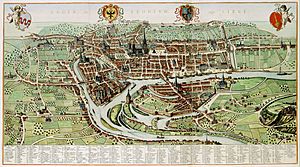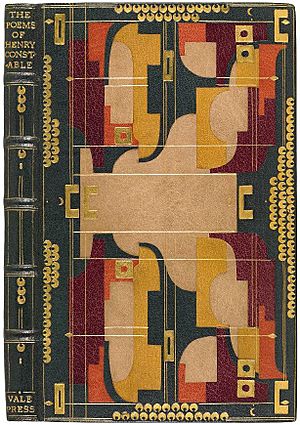Henry Constable facts for kids
Quick facts for kids
Henry Constable
|
|
|---|---|

Liège in 1649, a few decades after Henry Constable's death there in 1613
|
|
| Born | 1562 Newark-on-Trent |
| Died | 9 October 1613 Liege, Belgium |
| Father | Sir Robert Constable |
| Mother | Christiana Dabridgecourt |
Henry Constable (born 1562 – died 9 October 1613) was an English poet. He is famous for his book Diana, which was one of the first collections of sonnets in English.
In 1591, Henry Constable became a Catholic. Because of this, he had to live outside England for many years. He came back to England when King James became king. However, he was soon held in the Tower and later in the Fleet. He died in Liège, Belgium, in 1613, still living away from his home country.
Contents
Who Was Henry Constable?
His Early Life and Family
Henry Constable was born in Newark-on-Trent, England, in 1562. He was the only child of Sir Robert Constable and Christiana Dabridgecourt. His father, Sir Robert, was a knight who served in the military. He was also an important public official.
Through his family, Henry's father had connections that helped his career. Sir Robert fought in the campaign after the Northern Rebellion in 1569. He was made a knight for his service.
His Education and Early Career
Henry Constable went to St John's College, Cambridge in 1578. He earned his first degree in 1580. Later, in 1583, he joined Lincoln's Inn to study law. However, he did not continue his legal studies.
In 1583, Constable traveled to Scotland. He then worked in Paris for the English ambassador, Sir Edward Stafford. This was from 1583 to 1585. He also visited Heidelberg and possibly Poland. During this time, he often spoke up for Protestant causes.
Life at Court and Religious Change
Around 1588-1589, Henry Constable was likely at the English royal court. He was even said to be one of Queen Elizabeth's favorite people.
In 1589, he went to Edinburgh for the wedding of King James VI. At this time, he was part of the group around Robert Devereux, 2nd Earl of Essex. He seemed to be a Protestant. However, he secretly wrote a paper in 1589 that supported the Roman Catholic King Henri IV of France.
In 1591, Constable went to France with English forces. While there, he openly became a Roman Catholic. This was a big change, as England was a Protestant country. The French King Henri IV gave him a small pension, which was like a regular payment.
Life in Exile and Imprisonment
For the next ten years, Henry Constable mostly lived in Paris. He also traveled to Rome in 1595. He tried to keep his connections with important English figures, even writing to Essex. He always said he was loyal to Queen Elizabeth. He also supported King James's claim to the English throne.
In 1599, Constable visited King James in Scotland. They spent time together, talking about poetry and religion. In 1600, he went to Rome again. He wanted the Pope's approval for another visit to King James.
When King James became King of England, Constable hoped to return home. He wrote to friends and important people for help. By December 1603, he was back at court. He even got back the lands he had inherited.
However, Constable kept trying to convince King James to be more accepting of Catholics. This led to his arrest. He was held in the Tower of London from April to July 1604. He was later placed under house arrest and lost his inheritance. He was also held in the Fleet prison in 1608.
His Final Years
In 1610, Henry Constable was allowed to leave England. He went back to Paris. There were rumors of his death in 1611, but they were not true. He died in Liège, Belgium, on 9 October 1613. He was still living outside England.
His Writings and Poems

Henry Constable is best known for his book of sonnets called Diana. It was published in 1592. This was one of the first collections of sonnets in English. A sonnet is a poem with 14 lines.
A second edition of Diana came out in 1594. It included new sonnets by Constable and poems by other writers. His poems were also featured in other collections, like England's Helicon in 1600. Some of his famous poems include Damelus Song to his Diaphenia and Venus and Adonis.
People at the time thought highly of Constable's poetry. Another play from his era, The Return From Parnassus, praised his work. It said his poems "take the wondering ear" and hold it "in willing prisonment."
The famous writer Ben Jonson also admired Constable's poems. He wrote about how Constable's "ambrosiac muse" made "Diana not his notes refuse." This shows how respected Constable was as a poet.
Constable also wrote some religious papers. He wrote a paper supporting King James's right to the English throne. This paper was printed in Paris in 1600.

